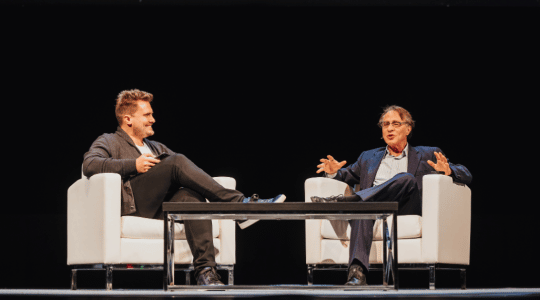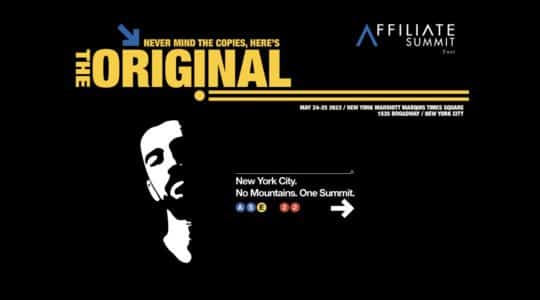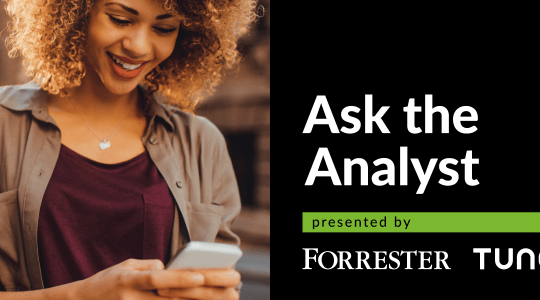Building an app can take precious time and resources. Between wireframes, monetization strategies and market analysis, it can often be easy to forget one of the most important aspects of this process – how in the world do you go about acquiring new users?
Yesterday at MobileBeat in San Francisco, our very own Peter Hamilton hosted a panel to discuss just this with Joe Braidwood (CMO, Swiftkey), Adam Grenier (Director of Mobile Marketing, HotelTonight) and Tracy Sun (CoFounder and VP Merchandising, Poshmark). Peter picked the panelists’ brains about what metrics are actually meaningful in the user acquisition process, what creative ways they used to acquire users, and what advice they have for new app marketers.
Find the Metrics that are Meaningful to YOU
Most app marketers think user acquisition is an easy metric. For Joe Braidwood, measuring new users actually is easy as Swiftkey is simply sold in Google Play for $3.99 as a paid single purchase. As he says, “this is a very classic business model. However, Swiftkey is currently number one in the app store and the company is considering changing their business model soon, possibly to a freemium version.
However, for Adam Grenier and HotelTonight, metrics surrounding user acquisition are not so simple. HotelTonight’s business model is a revenue share with hotel partners, but consumers may not book a hotel for many days, weeks, or even months until after they installed the app (which is free). Not only does Adam look at installs, but also registrations and the quality and quantity of the hotels being booked. HotelTonight has found that first time bookings tend to reflect the type of booking users are going to make in future, so identifying this as a metric is critical for the company. Additionally, Adam takes into account the spontaneity of users — a theme that other app marketers spoke about throughout the conference, indicating that the level of spontaneity is definitely a critical metric in user acquisition.
Be Creative
User acquisition methods include more than just promoting your app on Facebook. All of the panelists agreed that using creative ways to recruit and retain users has been important in their success. For Poshmark, Tracy Sun elaborated, “One of the most creative things that we do are virtual shopping parties. However, what you might not know is we take these parties offline and invite influencers and celebrate their closets with gatherings and talk about our shared love of fashion. Everyone has their phones out and inevitably the conversation leads back to Poshmark.” However, it’s obviously hard to measure the ROI of these types of events. As a result, Tracy says “…so we’ve gone off of our very strong gut instinct – which is weird to say.” However, the organic growth and connections built with the parties have obviously been well worth it.
Adam adds that HotelTonight partnered with a publishing firm in the travel space to tap into its users to create city guides such as places to go and places to stay. This partnership helped build brand awareness and app usage as it was a pay for performance partnership.
From One App Marketer to Another
While Joe, Adam and Tracy are veterans in the mobile space, the industry is quickly growing. Joe says he has learned a lot from the gaming industry, especially as gamification relates back to user behavior. He has found that not only is product really important, but also building a community that wants to keep using the app. Adam added that it is critical to be patient when building and marketing a new app. Adam warned, “Don’t look for quantity. If you’re looking for quality, it takes a lot of time and optimization. If you do a lot of stuff that drives not quality users, you will end up with a ‘not quality’ app.”
Tracy laid down the bottom line for thinking about user acquisition. “The mobile space moves really quickly and needs serious attention and bandwidth. It’s not just about making money. It’s about deeply connecting with your users.”
Author
Becky is the Senior Content Marketing Manager at TUNE. Before TUNE, she handled content strategy and marketing communications at several tech startups in the Bay Area. Becky received her bachelor's degree in English from Wake Forest University. After a decade in San Francisco and Seattle, she has returned home to Charleston, SC, where you can find her strolling through Hampton Park with her pup and enjoying the simple things between adventures with friends and family.




hey, nice post, as it is very useful for the mobile app developers, who develops the mobile apps to sell in market. They got an idea about the market people , what they want so that the app remains in the market for long time .
Thanks for the Post.